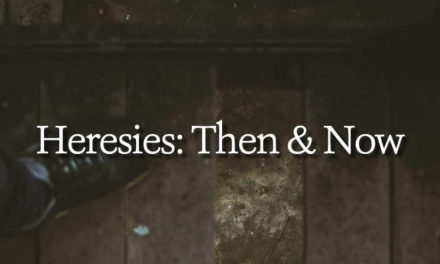By Bob Waldrep
November 2003
Almost every parent has said it. Their child sees a particular toy or candy that they must have. They then begin to ask, to beg, to pitch a tantrum, to do whatever it takes to get the desire of their heart. The shrill cries of “I want it! I want it!” seem incessant. Finally, not able to take any more, the irritated parent says what they heard from the lips of their own parents: “You don’t always get what you want!” Most folks believe that this is one of life’s great lessons. However, there is one group of people that just doesn’t buy it: those who embrace Word Faith teaching. In fact, many of them believe that if you want something, just speak it into existence. However, they believe not only that you say what you get – you also get what you say, good or bad.
Gloria Copeland, a Word Faith teacher and the wife of popular televangelist Kenneth Copeland, put it this way during a recent broadcast of their television program:
“One of the first things that Ken and I learned when we started walking in the power of God was that our words had to match what we wanted to come to pass. And we learned it from the Scripture. We learned it from Kenneth Hagin.”1
Another prominent teacher who popularizes this belief through her seminars and radio and television broadcasts is Joyce Meyer. She echoed this teaching when promoting her tape series, “Is Your Mouth Saved?”:
“Now I want you to realize that words are containers for power and they carry either creative or destructive power and we need to be very careful about the words of our mouth.”2
A brief commercial for the series then runs in which a young lady preparing for a job interview declares, “Why am I even doing this? I’m too stupid to get this job. They are not going to hire me anyway.” In Word Faith teaching, this kind of statement is known as negative confession, and will bring about the bad results that are confessed. Her husband then enters the picture and confidently asserts, “You need to listen to Joyce.”
And what does she hear Joyce say? “What you say is what you get. The Bible says that we call those things that be not [sic] as though they are. And it doesn’t just work in the positive, it works in the negative. Words are containers for power and they carry either creative or destructive power.”
The camera then switches back to the woman making the positive affirmation, “I can do all thing through Christ who strengthens me.”3 The clear implication is that if this woman continues to make negative confessions, she will not get the job-but if she speaks positively, she will get the job.
Meyer’s seminars, books and tapes are extremely popular, and concerns are frequently raised as to whether or not she should be classified within the heretical Word Faith Movement. Though there is diversity of belief and practice among those who might be classified as, or consider themselves, part of this group, they typically will agree on several key doctrines. Meyer teaches or has taught at least four of the more prominent of these:
1. God creates by using His faith through the power of spoken words.
2. Man is a “little god” capable of creating in the same fashion as did God.
3. Man, through faith-filled words, creates or causes to come to pass that which is spoken. Thus by one’s spoken words health/healing and wealth/prosperity are created.
4. Jesus earned our redemption, not on the cross, but in hell.
The view presented in the promotion of her new tape series is not a new understanding or teaching for Meyer. In an article titled “Your Mouth is a Weapon,” Meyer expressed the same idea in similar words: “We can help the devil bring destruction into our lives, or we can learn how to agree with God and experience His best for us.”4
Later, she explains her view further: “Romans 4:17 says God gives life to the dead and speaks of the nonexistent things as if they already existed. He created the world with faith-filled words (see Genesis 1). We are created in His image, and we can also call things that are not as though they are. We can speak positive thoughts about ourselves into the atmosphere and thereby ‘prophesy our future.’ ” 5
How does this apply to the key Word Faith areas of health and wealth? Meyer explains in this same article: “The Lord recently showed me that we can bless or curse the financial seed we sow. We can speak positively about our financial future, or we can say things like, ‘I can’t afford it’ . . . ‘Every time I turn around something happens to take my money’. . . . We should water our giving with the water of His word and expect an abundant harvest. Sow your seed and speak prosperity scriptures over your finances.” 6
She continues: “Proverbs 18:21 teaches us that the power of life and death are in the tongue. That means we can speak life to dead circumstances, but it is a choice and decision not made with feelings as its basis. We can also speak death to sick circumstances. In other words, we can have something negative (sick) happen, and we can cause very serious problems by speaking negatively about it. It may go from sick to dead, especially if we repeatedly talk hopeless, negative, and downcast.
On the other hand, we can choose to do what seems abnormal to the natural man. We can speak life to sick circumstances and see a complete recovery before Satan has an opportunity to gain a stronghold.” 7
Words are indeed powerful: a word spoken harshly or in anger can cause great harm, while a word spoken with gentleness and love can be a soothing balm. However, words do not have the power in and of themselves to change circumstances or to manipulate God to do whatever a person speaks.
How do Meyer and other Word Faith proponents come to the conclusion that their words alter or shape their reality? This belief is based on a misunderstanding of Genesis 1:26-27, in which God makes mankind in His own image. Word Faith teachers also cite Psalm 82:6 and John 10:34 as support for their position, because each verse uses the phrase “Ye are gods,” referring to certain humans. Word Faith proponents interpret these passages to mean that man is a little god with the same creative powers of God, Who spoke the world into existence.
Word Faith teacher Charles Capps explains this teaching in his book, The Tongue a Creative Force: “This is not a theory. It is a fact. It is a spiritual law. It works every time it is applied correctly. God never does anything without saying it first. God is a faith God. God released His faith in Words. . . . Man was created in God’s class: very capable of operating in the same kind of faith. Man is a spirit, he has a soul, he lives in a body. . . . Man is a spirit being, very capable of operating on the same level of faith as God.”8
In commenting on this same doctrine passages in her message “Authority and Opposition,” Meyer states, “You know, I was listening to a set of tapes by one man and he explained it like this, and I think this kind of gets the point across, he said, ‘Why do people have such a fit about God calling His creation, His man-not His whole creation, but His man-little gods? If He’s God, what’s He going to call them but the god-kind?’ I mean, if you as a human being have a baby, you call it a human kind. If cattle has another cattle, they call it cattle-kind. So, I mean, what’s God supposed to call us? Doesn’t the Bible say we’re created in his image? Now, you understand I am not saying you are God with a capital G.”9
While Meyer doesn’t name the speaker whose tapes she was listening to, it could be almost any of the prominent Word Faith teachers because this is a commonly held teaching. For example, Earl Paulk states, “Just as dogs have puppies and cats have kittens, so God has little gods. Seed remains true to nature, bearing its own kind.” 10
No one better illustrates the natural conclusion of this erroneous teaching than Faith leader Kenneth Copeland when he states: “Adam is as much like God as you could get, just the same as Jesus when he came into the earth. He said, ‘If you’ve seen me, you’ve seen the Father.’ He wasn’t a lot like God, he’s God manifested in the flesh. And I want you to know something, Adam in the Garden of Eden was God manifested in the flesh! He was God’s very image, the very likeness; everything he did, everything he said, every move he made was the very image of Almighty God.” 11
No wonder Copeland could makes such a statement as “When I read in the Bible where he says ‘I am,’ I just smile and say ‘I am too.’”12
Copeland’s statements represent the extreme views held regarding the “little gods” doctrine. Others, while professing to hold to this doctrine, are not quite as clear as to what they really believe it means. As Rob Bowman points out in his The Word-Faith Controversy, “It is only the vague and contradictory character of most Word Faith teachers’ explanations that prevents us from concluding definitively that their “little gods” doctrine is itself necessarily heretical. In general, their teachings on this subject appear to range from the rather aberrant (Kenyon) to the outright heretical (almost certainly Copeland). While we must be careful not to over generalize the error, there is no getting around the fact that the doctrine of human beings as little gods is indeed seriously erroneous.”13
Not only has Meyer taught the “little gods” doctrine and the prosperity message of the Word Faith Movement, but she has also taught that Jesus paid the price for redemption in hell. In her book entitled The Most Important Decision You Will Ever Make, beneath the caption “What Should You Believe,” she writes: “Believe that Jesus did what the Bible says. Believe He is indeed the Son of God, born of a virgin. He took man’s sin Himself. He became our sacrifice and died on the cross. He did not stay dead. During that time He entered hell, where you and I deserved to go (legally) because of our sin. He paid the price there.”14 (emphasis added)
The teaching that Jesus paid the price in hell is widely held among Word Faith adherents. Its basis begins with their belief that, rather than paying the price for sin on the cross, Jesus instead became sin or a sinner while on the cross, taking upon himself a debt that would require him to go to hell in order to pay the price. Again, Copeland clearly articulates the extremes to which this teaching can lead. In his message “What Happened From the Cross to the Throne,” he proclaims: “Jesus was made to be sin. He accepted the nature of Satan into his own spirit. . . . You don’t know what happened at the cross. Why do you think Moses upon the instruction of God raised a serpent up on that pole instead of a lamb? That used to bug me, I said why in the world did you have to put that snake up there, the sign of Satan? Why didn’t you put a lamb on that pole? And the Lord said, ‘because it was the sign of Satan that was hanging on the cross’. He said, ‘I accepted in my own spirit spiritual death and the light was turned off.’ ”15
Copeland maintains not only that Jesus became sin but that His victory over Satan was not guaranteed: “[I]f Satan is capable of overpowering him [Jesus] there, he’ll win the universe and mankind is doomed. And don’t get the idea that Jesus was incapable of failure, for if he had been it would have been illegal.”16
Word Faith teachers conclude that Jesus died spiritually on the cross when he took man’s sin upon himself (thus becoming a sinner in need of redemption), was ushered into hell where for three days he strove to win his own redemption and man’s, and by earning this redemption became a born-again man and thus could legally offer redemption to man as well.
Without question Meyer is familiar with this distortion of the gospel message. In her book The Most Important Decision You Will Ever Make, she proclaims that, “He [Jesus] was resurrected from the dead-the first born-again man.”17 Under the caption “What Happened on the Cross,” she asserts that, “His [Jesus] spirit went to hell because that is where we deserved to go. . . . Jesus went to hell for you. He died for you. He paid for your sins.”18
Note the similarity of Meyer’s teaching to Copeland’s, extending even to a similar title to Copeland’s “What Happened from the Cross to the Throne. The idea that, in taking our sin upon Him, Christ became spiritually dead, a sinner in need of being “born-again,” is clearly a departure from the Biblical account. As Bowman rightly points out:
We need to be born again because we are spiritually dead in our trespasses and sins (Eph. 2:1) Jesus has never had any need to be born again. In fact, it is precisely because Jesus was without sin and died for the sins of others that his resurrection could be the fountain of resurrection life for others. The teaching that Jesus was born again, therefore, is contrary to the very heart of the gospel of salvation through the death and resurrection of Christ.”19
In studying Meyer’s work, it is evident that she did not start out as a follower of or proponent of Word Faith teaching, and that her efforts have been of great benefit to many, particularly the women to whom she has ministered. However, along the way she has embraced at least some of the Word Faith teachings and now has one foot firmly planted in that theological camp. Her continuing movement toward Word Faith teachings and her association with Word Faith teachers and their message makes it vitally important that those who plan to continue attending her seminars and purchasing her materials exercise a greater degree of caution and discernment.
For a good resource on Word Faith, we recommend The Word Faith Controversy by Robert M. Bowman.
Endnotes
1.Gloria Copeland, Bleliever’s Voice of Victory telovision program, 7/08/03.
2.2. Joyce Meyer, Life In the Word television program, 7/03/2993.
3.Ibid.
4.Joyce Meyer, “Your Mouth is a Weapon,” Life in the Word March 1997, p.2.
5.Ibid, p.4.
6.Ibid.
7.Ibid.
8.Charles Capps, The Tongue a Creative Force, pp.130-131.
9.Joyce Meyer, “Authority and Opposition,” audio tape 1236.
10.Earl Paulk, Satan Unmasked, p.96.
11.Kenneth Copeland, :Following the Faith of Abraham,” audio tape 01-3001. Quoted in Word Faith:The Cancer Within video tape, Adonai Productions.
12.Ibid.
13.Robert M. Bowman, Jr., The Word-Faith Controversy, p.136.
14.Joyce Meyer, The Most Important Decision You Wil Ever Make, p.35.
15.Kenneth Copeland, “What Happened From the Cross to the Throne,” audio tape 02-0017. Quoted in Word Faith:The Cancer Within video tape, Adonai Productions.
16.Ibid.
17.Joyce Meyer, The Most Important Decision You Will Ever Make, p.36.
18.Ibid., pp.37-38
19.Robert M. Bowman, Jr., The Word-Faith Controversy, p.176.






